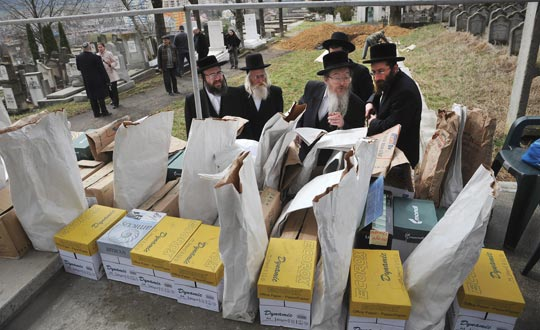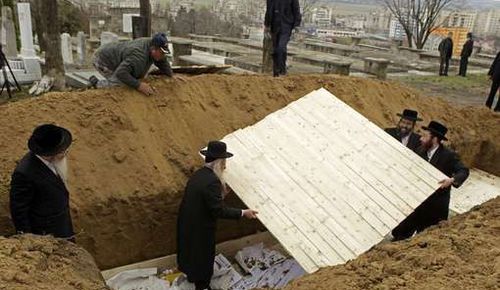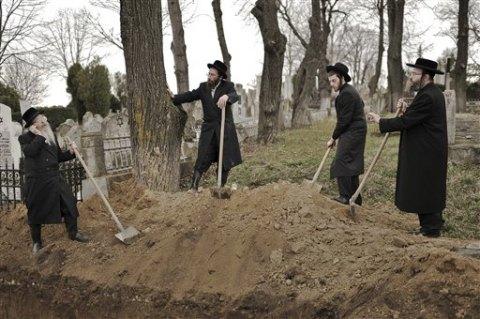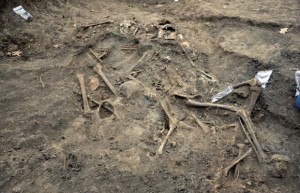Sunday, April 10th, 2011
by Carolyn Yeager
But you’d never know it from reading the newspapers.
Five months after the original discovery, the Romanian mass grave case seems to have reached closure. In my Nov. 17 blog, I promised you I would keep my eye on this story. Just as I had begun to think it was a dead issue, the news broke.

Rabbis from England and the U.S. supervise the boxes and bags containing the remains of 35 to 40 persons removed from a mass grave in Iasi, Romania in Nov. 2010. [photo credit: Daniel Mihailescu]
Jewish rabbis buried the remains of 35 unidentified persons in a single grave in the Jewish cemetery in Iasi, a town in northeastern Romania. The Romanian authorities found 35 sculls in a mass grave, but the spokespersons for the Elie Wiesel National Institute for the Study of the Holocaust in Romania, which claims to have discovered the grave last year, says they can make the number at least 40 because “other remains were found.” Most news reports, however, including Haaretz, Reuters and Vos Iz Neias (an Orthodox Jewish website), reporting from Jewish sources, changed the number to 60, and even implied via confusing language that there were 100 bodies. One hundred was the estimate used by the Wiesel Institute before the grave was fully emptied.
Voice of America writes: “It is not clear how many people are represented by the remains. Estimates range from 40 to 100.
The Reuters article stated: “We gathered here to bury remains of 60 Jews murdered 70 years ago … This moment marks a duty of ours,” Aurel Vainer, head of the Federation of the Jewish Communities in Romania told Reuters.
Vos Iz Neias said: “The memorial, dedicated to about 60 victims unearthed in a forest area near the village of Popricani …” and “Quoting witnesses, the Elie Wiesel institute said more than 100 Jews—men and women, including elderly people, and children—were buried there.”
Haaretz: “The remains of dozens of Jews killed by Romanian troops during World War II have been buried …” and “In November, a Holocaust-era mass grave containing the bodies of an estimated 100 Jews was discovered in a forest …”
I guess these statements could be true if many of the victims were headless. The most accurate coverage we’ve seen comes from The Times of Malta.
Still not confirmed to be Jews
At the time of the discovery, Jewish religious authorities showed up at the site and demanded that Jewish halachic law be followed by not disturbing the bones since they believed they were Jewish bones. However, as I reported previously, the chief prosecutor in Iasi, Cornelia Prisacaru, stated plainly: “We can’t confirm that they are Jews.” And that confirmation has not come. Prisacaru also said at that time: “They could be Russian or German soldiers.” Live WWII munitions were found there in addition to human remains.
The first thing the Romanian authorities did was to close off the area, then unearth all the remains and bring them to laboratories for “forensic testing.” No results have been announced; perhaps something will be forthcoming, or perhaps nothing more can be determined. If the remains had been declared by the prosecutor’s office to be Jewish bones, the Jews would surely have announced that as loudly as possible. Since they have not, we can assume for the time being that it was not determined.
However, the Jews were convinced from the moment of discovery that they are Jewish remains, based on local witness testimony of one or two individuals, and the fact that they say some bodies were clothed in “identifiable Jewish garments.”
There is no word whatsoever from the Romanian prosecutor’s office, except that the boxes and bags of remains were turned over to the official committee of rabbis from England, United States and Romania.

Jewish rabbis preparing the grave to be covered with soil on April 4, 2011. This photo angle gives a good idea of the size of the grave.
Did the Jews win or lose?
The rabbis and Jewish media are putting the best face on it, but they were denied their demand that the bones remain where they were found so that they can build a memorial at the site. They insist these were Holocaust-related deaths which can be blamed on the Romanian Army, allied with the Nazi Party in Germany. The Jews have never failed in the past to persuade national governments to hand over the land where they believe Jews are buried, on which they then build an on-site Holocaust memorial, assuring that the area can never be explored further. This time, however, the Romanians said no, probably because there was:
- No assurance they were Jews
- No assurance they were Holocaust-related
On November 23 last year, The Committee for the Preservation of Jewish Cemeteries in Europe issued a statement in London that “this was the first time ever that a national government is openly declaring its intention to proceed in the disturbance of the graves of Holocaust victims.” All I can say is, it’s about time. Congratulations to the Romanian government.
Thus, the rabbis were forced to bury the remains in a Jewish cemetery nearby. A single large grave was dug to hold all the boxes. Since goyim don’t visit Jewish cemeteries, the propaganda value of the “murdered Jews” is destroyed. But the rabbis did hold a ceremony and made solemn pronouncements with all the dignity of which they are capable.
What if they are not Jews?
The question remains: Since the Jews insisted these were Jewish victims of a pogram, leaving them with no option but to bury them in the Jewish cemetery … what if they’re not Jewish? They may be putting non-Jewish, or what they call Goyim, bones into their Jewish ground and blessing them … a terrible desecration according to their law. I believe they had no choice because image and propaganda is more important to them than their law. Their propaganda insists on Jewish victims, and their image does not allow that they might be wrong.

Rabbis take a pause from their labors of filling in the grave after placing the physical remains inside. Do you think they really did it all themselves or is this what is called a “photo opportunity.”
Will this be the last of the Romanian mass grave story? I hope so. But if we hear more about it, we will let you know. The black-eye should go to the Elie Wiesel National Institute for the Study of the Holocaust in Romania for making exaggerated claims in the beginning, which they knew were unfounded. But you just watch—the media, and the local history (based on the Wiesel Institute), will be describing the original grave as holding 60 to 100 bodies, and anyone protesting that number will not be heard. But you can count on always getting the real story here on Elie Wiesel Cons the World website.
See original blog: Wiesel Institute in Romania says it found mass grave of Jews.
11 Comments
Category Featured | Tags: Tags: Cornelia Prisacaru, Elie Wiesel Natl. Inst. for the Study of the Holocaust in Romania, forensic testing, Jewish rabbis, mass grave, Romania,
Social Networks: Facebook, Twitter, Google Bookmarks, del.icio.us, StumbleUpon, Digg, Reddit, Posterous.
Wednesday, November 17th, 2010
A Time magazine blog reveals that the Romanian chief prosecutor in Iasi, Cornelia Prisacaru, said, “At this moment we don’t know if these are civilian or military bodies. Or could they be Russian or German soldiers? The front line was in that area during World War II. We can’t confirm that they are Jews.”
This is disturbing to the Judaics who have already claimed the site as their own and called in rabbis to bless it, this being standard practice at all sites that they “discover.” Will the Romanian officials be able to stand up to the Elie Wiesel Institute and the rabbis to proceed along scientific lines in determining the origin of the bones? Or will they be bribed and bullied into allowing Wiesel and his fellow amateurs to take over the site and make it into what they want the world to believe? Stay tuned; we will not take our eyes off this developing story. ~CY
From Time blogger Rupert Wolfe Murray, Friday Nov. 12, 2010: One day in 1941, Vasile Enache was tending his cows in the forest of Vulturi, near the city of Iasi, 260 miles (420 km) northeast of Bucharest, when he heard people sobbing. He went to investigate and saw hundreds of civilians being marched through the forest by Romanian army soldiers.
[…]
After persuading Enache to show him the exact location of the Vulturi grave, local historian Adrian Cioflinca organized a team of people from Romania’s Elie Wiesel National Institute for Studying the Holocaust to start excavating the site last month. They uncovered the remains of 16 bodies — including the skeletons of children, a lady’s shoe and Romanian-army bullets from 1939 — but have since called a halt to the dig while they wait for rabbis to bless the site.
Now 86, Enache is a bit wobbly on his legs, but his eyes are still clear blue, and his memory of what happened that day in 1941 is fresh. He describes how he was grabbed by a couple of Romanian soldiers who said, “You are a Jew! Come with us.” They arrived at a series of deep graves where the civilians were made to sit down, 10 at a time, and then shot. Others were ordered into the grave to arrange the bodies so more victims could be thrown in. The killings continued all day, but Enache managed to convince his captors that he was a local, an Orthodox Christian, and when this was confirmed by the local forester, he was released.
The Vulturi forester who saved Enache died in 1945, but his daughter still lives nearby. Sitting in her kitchen, Lucia Baltaru describes what she remembers from 1941, when she was 6 years old. “We used to go and play at the grave,” she says. “There was a thin layer of soil over the grave, and when we played, the bodies would move around. I think there are thousands of bodies buried there.”
The site is currently sealed off by the Romanian police, who are guarding the bones and artifacts still on the site, and both journalists and the public are forbidden access.
Elie Wiesel […] has described Romania’s approach to the Holocaust as “ambivalent.”
[…]
This ambivalence is reflected in the Romanian media coverage of the latest mass-grave discovery. The country’s main private TV channels are skeptical, basing their reports on a statement by the chief prosecutor in Iasi, Cornelia Prisacaru, who said, “At this moment we don’t know if these are civilian or military bodies. Or could they be Russian or German soldiers? The front line was in that area during World War II. We can’t confirm that they are Jews.”
Read more: http://www.time.com/time/world/article/0,8599,2031066,00.html#ixzz15YJK9vhl
1 Comment
Category Featured | Tags: Tags: Cornelia Prisacaru, mass grave, Romania, Time magazine,
Social Networks: Facebook, Twitter, Google Bookmarks, del.icio.us, StumbleUpon, Digg, Reddit, Posterous.
Saturday, November 6th, 2010
FYI: This is an example of an all-propaganda, no-forensic information “news article” that has been copied by AFP from a “News Release” sent out by the Elie Wiesel National Institute for the Study of the Holocaust in Romania. Photograph and all. They publish it “as is” without checking facts. Notice there is no author for this story; no journalist wrote it. The article below appeared in the Montreal Gazette on Nov. 5. The Montreal Gazette seems to be a news outlet specially partial to Israel and Jewish propaganda. I have added my comments ~CY.
MASS GRAVE OF VICTIMS UNEARTHED IN ROMANIA
AFP November 5, 2010
 Human remains are seen after archaeologists uncovered a mass grave of Jews killed by Romanian troops during World War Two in a forest area near the village of Popricani, close to the city of Iasi, in northeast Romania.
Human remains are seen after archaeologists uncovered a mass grave of Jews killed by Romanian troops during World War Two in a forest area near the village of Popricani, close to the city of Iasi, in northeast Romania.
Photograph by: Anthony Cioflanca, Elie Wiesel National Institute for the Study of the Holocaust in Romania.
[Comment: Notice that Cioflanca is employed by the EW Nat. Inst. in Romania. He is the only “archaeologist” mentioned and does not seem to be a real archaeologist. If he were, his credentials would be given. Therefore, who are these archaeologists that uncovered the grave?]
BUCHAREST – A mass grave containing the bodies of Jews killed by the Romanian army during World War II has been discovered in a forest in northeastern Romania, the Elie Wiesel National Institute said on Friday.
[Comment: It’s not been forensically determined that they are Jews; they are being called Jews based on “talking to locals.”]
“So far we exhumed 16 bodies but this is just the beginning because the mass grave is very deep and we only dug up superficially”, Adrian Cioflanca, the researcher at the origin of the find, told reporters during a press conference.
[Comment: They say they have 16 “bodies,” but they claim 100 before they ever find them.]
The Elie Wiesel National Institute for the Study of the Holocaust in Romania and Cioflanca both said they believe up to 100 bodies could be buried in the mass grave.
The find, in the Vulturi forest in Propricani, about 350 kilometres (220 miles) northeast of Bucharest, is “further evidence of the crimes committed against Jewish civilians in Romania”, Elie Wiesel institute head Alexandru Florian said.
“It is another testimony of a shameful period in Romania’s history”, Aurel Vainer, representative for the Jewish community at the lower house of parliament said.
[Comment: Two quotes solely of propaganda value from two political, activist Jews pointing the finger at Gentiles before the evidence can be studied. This is the formula that we have seen used over and over.]
According to an international commission of historians led by Nobel Peace laureate Elie Wiesel, himself a Romanian-born Jew, some 270,000 Romanian and Ukrainian Jews were killed in territories run by the pro-Nazi Romanian regime during 1940-1944.
[Comment: Now we come to the blanket statement of distorted historical “truth.” When did Elie Wiesel become a historian? He is not. Where does the figure of 270,000 Romanian and Ukrainian Jews come from? What “international commission” is being referred to?]
This is the first time a Holocaust-era mass grave has been discovered since 1945, when 311 corpses were exhumed from three locations in Stanca Roznovanu, close from Iasi, according to the Wiesel Institute.
[Comment: No wonder they are trying to make a big deal of it. They need to come up with something after 65 years of nothing but “witness testimony.”]
“For a long period of time, no research was done because the subject was taboo under the communist regime (1945-1989) and also for some years after the return of democracy in 1989″, Cioflanca told AFP.
[Comment: Just think how tough the communist regime of ‘45-’89 made it to get any truth for Germans. The taboo in place by the Holocaust enforcers up till this very minute makes it very difficult to disseminate any truth for German losses, and who the true perpetrators were. Democracy is of no avail in their case.]
[NOTE: From an updated AP report in the Kansas City Star, we read: “Romania’s role in the Holocaust remains a sensitive and highly charged topic. During communist times, the country largely ignored the involvement of Romania’s leaders in wartime crimes.” If this is the case, it’s very likely the Communists did the killing, not Romanian “Nazis.” But it is in the interest of the Elie Wiesel Institute on the Holocaust in Romania to blame the “Nazis” and “fascists” in order to bolster “Holocaust” claims, if at all possible. Naturally, the current Romanian regime will go along with that. The Jews will cause them endless trouble if they don’t; Germans and Romanians will not say a word. To get to the bottom of the events that are behind the discovery of these bones would take an honest, careful investigation by neutral scientists — which is not what we’re seeing here.]
Things improved after the Wiesel-led commission’s report in 2004 and in 2006 president Traian Basescu called on his fellow countrymen to face up to the role played by the pro-Nazi regime of wartime Romanian dictator Ion Antonescu.
The mass grave in Propricani was discovered after Cioflanca, a historian, gathered testimonies of local inhabitants who saw the killings of Jews. One of the witnesses escaped after convincing the Romanian troops that he was an Orthodox Christian, Cioflanca said.
[Comment: Now Cioflanca is called an historian; previously he is called a “researcher” and also an “archaeologist.” But his actual credentials are never given. What are they? Because he “gathered testimonies of local inhabitants” – this qualifies him as an historian?]
The victims could be Jews from the northeastern city of Iasi, where Romanian officials and military units, assisted at times by German soldiers, killed at least 8,000 during a pogrom in 1941, according to figures by the U.S. Holocaust memorial museum.
[Comment: This is another blanket statement. The USHMM is not a credible, unbiased institution, but the product of Holocaust survivors, the Holocaust Industry, Jewish organizations, and Jewish influence in and on the US Govt. Their “figures” are meaningless without independent research and scrutiny.]
Many of them are buried in official common graves.
The researchers will now try to identify the bodies excavated.
“We will not be able to use DNA tests because we do not have any contact with potential relatives still alive and, to use DNA, you need to compare samples,” Cioflanca said.
[Comment: No relatives? What about the witnesses who saw what took place – they don’t know who any of them were? What about the one who escaped? Do they not want to use DNA because it could show these are not Jewish bones at all, but Romanian or some other. Notice how they don’t even consider that they might not be Jews. They want them to be Jews. The more dead Jews it can find, the happier the Elie Wiesel Institute is!]
The exhumations are expected to go on after consultations with the authorities.
[Comment: “Consultations” means pressure, bribery, threats of a political and financial nature. In other words, “we’ll destroy your careers if you don’t go along with us, and we’ll do all in our power to blacken Romania’s reputation and standing in the European Union.”]
The military prosecutor’s office has opened an investigation.
[Comment: [Will this be a real investigation or one run by the Jewish “archeologists” and “historians”? A necessary question.]
After the find, the Elie Wiesel Institute deplored the fact that some Romanian cities, like Sibiu, Pitesti and Timisoara, “still continue to celebrate the memory of Romanian officials who were war criminals and who took part in the persecution against Jews by giving their names to streets.”
[Comment: Ah, Elie. His heart still full of revenge for those “war criminals” who dared to lay a hand on a Jew. That a Romanian official should have his name on a street!! Make them all Jewish names as a proper memorial to their unique suffering; then Elie Wiesel might be satisfied.]
© Copyright (c) The Montreal Gazette
1 Comment
Category Featured | Tags: Tags: Elie Wiesel Natl. Inst. for the Study of the Holocaust in Romania, mass grave, Romania,
Social Networks: Facebook, Twitter, Google Bookmarks, del.icio.us, StumbleUpon, Digg, Reddit, Posterous.





